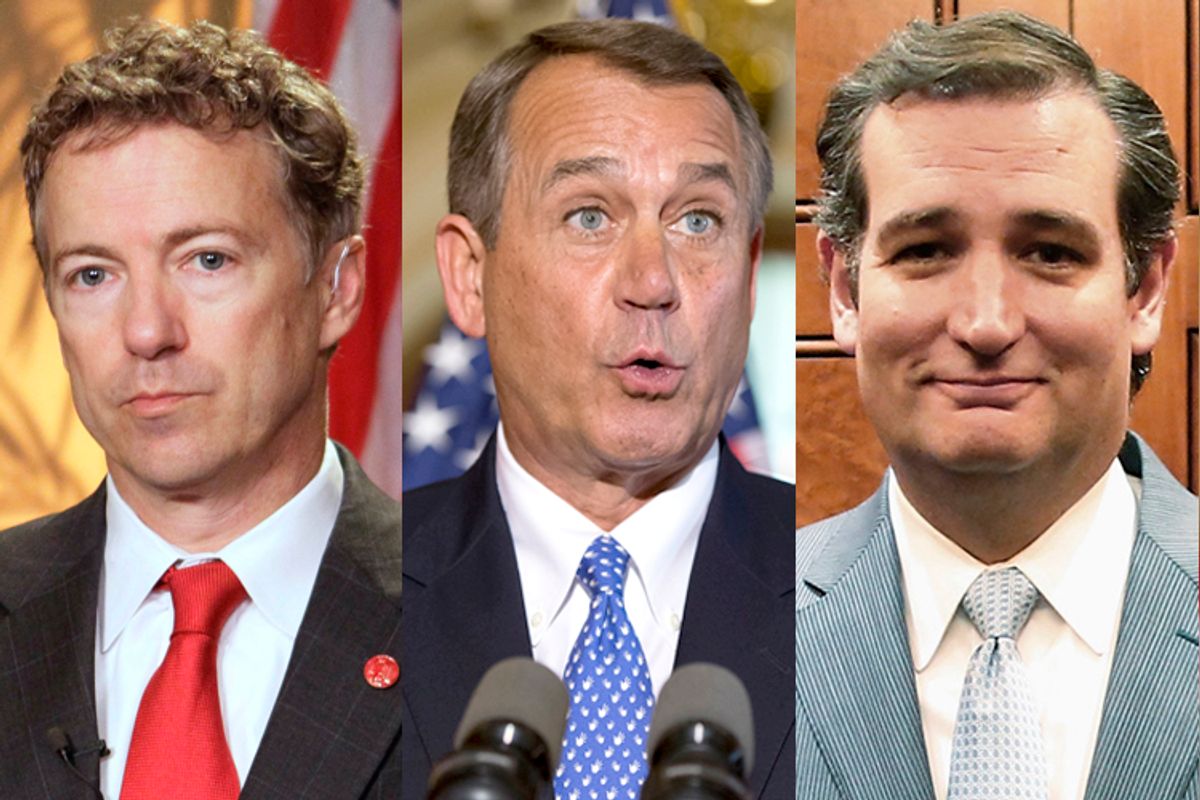This Thursday morning, I awoke to some wonderful and near-miraculous good news. Congress was finally learning to compromise and get things done, an email from Politico told me. After years of gridlock, stagnation, dysfunction and crisis, Congress had found a way to set aside partisanship and childish things. Now was the time, Politico intimated, when this august legislative body would begin to tackle the challenges of the present moment as only the most powerful nation in the world can.
Yes indeed, the rumors were true: Both sides in Congress had reached an agreement to once and for all pass a permanent “doc fix.” And once the deed is done, and news of it proliferates throughout the media and trickles down to the people, I imagine we’ll witness public displays of exuberance and relief unlike any we’ve seen since World War II ended — or Osama bin Laden was killed. So wrap yourself in the biggest flag you can find and say it with me now: USA! USA! USA!
All right, I’ll stop with the sarcasm, lest I reach Mitt Romney-levels of bitterness. You’ll forgive me, though, if I find the level of enthusiasm the permanent doc fix has inspired at Politico, the New York Times and other organs of the Washington establishment to be perplexing. Yes, it’s generally preferable that Congress stop wasting time every year with the “doc fix,” which postpones scheduled cuts to Medicare reimbursement rates that are strenuously opposed by doctors and their lobbyists. And, yes, it’s good that this permanent fix will include two years of funding for children’s health insurance.
But to call this agreement, as some have, a major, legacy-building accomplishment for Speaker John Boehner and Rep. Nancy Pelosi is ridiculous. And to extrapolate that it might herald a new era of productive bipartisanship would not only be dumb, but would be proof that the folks who live — physically or psychologically — in what my colleague Digby likes to call “the Village” still don’t understand why the last six-plus years have been so bad. It’s not because Congress can’t get anything done, per se; it’s because the only things Congress can get done are relatively minor and only matter to the 1 percent.
Which is, to a tee, the doc fix. As you may have heard, the American medical establishment is not only quite rich, but is also quite adept at working with lobbyists. You may also be aware that members of Congress, regardless of their party or ideological orientation, spend so much of their time fundraising, even Sisyphus would wince. Put those two facts together, and most anyone even vaguely familiar with the mechanics of Washington could guess what would come next. And since Congress can’t get itself to do anything about issues of greater importance, doc fix it is!
Yet as annoying as the hoopla over the doc fix is, it wouldn’t be worth spending much time on if the conversation about it didn’t contain some potentially nasty implications. But it does: namely, that Congress doing something, anything is what matters, regardless of whether or not that something-anything makes things better. It’s mistaking means and ends. And while shallow and flimsy thinking should always be rebutted, there’s a more important reason why the something-anything approach must be resisted. If it is allowed to metastasize, we could end up with the next president feeling obliged to do “big things” for their own sake.
Think of all the pressure there is right now to pass the Trans-Pacific Partnership, for example. Despite the fact that precious few know what’s actually in the sweeping arrangement, and despite the fact that the little we do know suggests the deal is bad, there’s real momentum behind jamming the bill through Congress and onto the president’s desk. Multinational corporations want the deal, of course. But the White House wants it badly, too. And when you read them explain why, you can see that a simple desire to get something big done — and added to President Obama’s legacy — is a real influence.
Now imagine it’s 2017, and Hillary Clinton or Jeb Bush is president. If the something-anything mind-set hasn’t been challenged — and especially if Congress remains undivided — the new president will feel compelled to, yes, do “something big.” If that something big has to do with climate change, immigration reform, or economic inequality, then so much the better. But think about the entrenched and powerful interests aligned in opposition to those kinds of policy changes, and think about how many of those interests would feel if the something being done was cutting Social Security instead.
Which one do you imagine would present the next commander-in-chief with the path of least resistance? It might depend, in part, on how the conventional wisdom comes to understand the “good” and “bipartisan” doc fix.

Shares